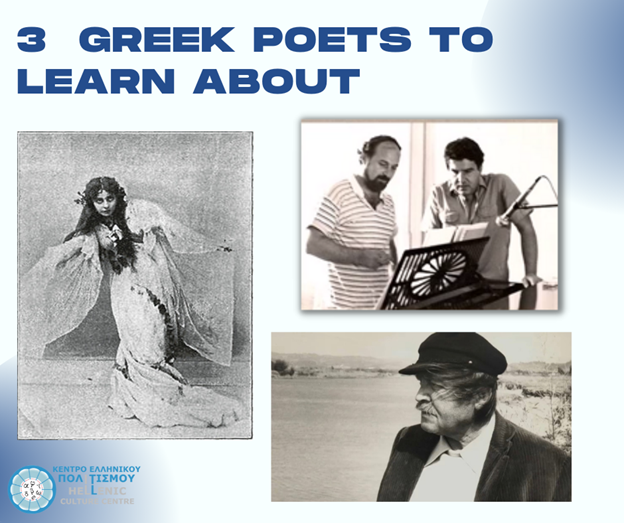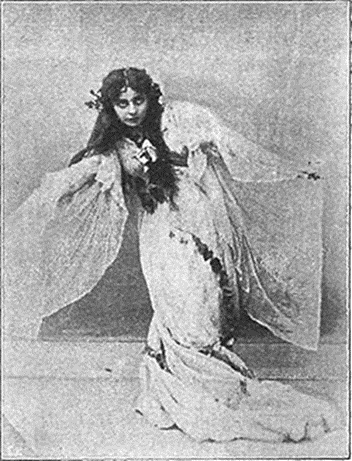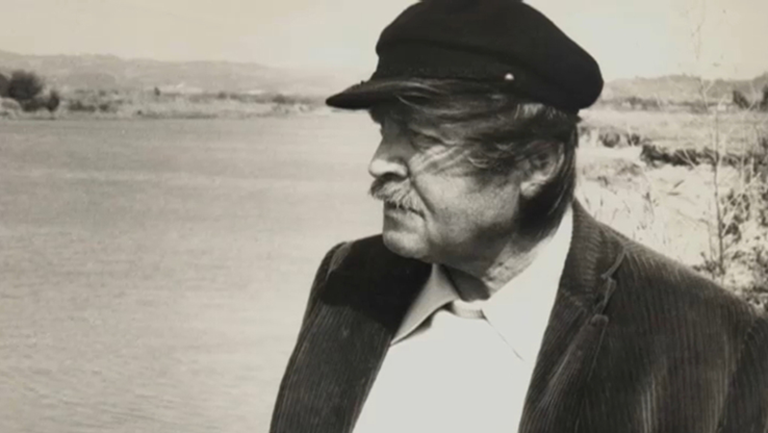
Celebrating World Poetry Day
World Poetry Day, celebrated every year on March 21, honors one of humankind’s most beloved mediums of linguistic and cultural expression and identity. Poetry, which has been embraced across history – across every culture and on any continent – appeals to our shared humanity and universal ideals, converting even the most modest verses into a compelling vehicle for communication, healing, and peace.
To celebrate World Poetry Day, the Hellenic Culture Centre remembers three very important and beloved – and maybe lesser known internationally – Greek poets.
Myrtiotissa
Quick Bio:
- Born: 1885 in then Constantinople (now Istanbul, Turkey)
- Died: 4 August 1968, at the age of 83.
Theoni Drakopoulou, widely known as Myrtiotissa, was a Greek actress and poet. She was nicknamed the “new Sappho” by some and is considered one of the most prominent female figures in modern Greek poetry. Myrtiotissa’s poetry writing is characterized by profound lyricism, and romanticism and her subjects include usually nature and the love-death diptych. Her close friendship with Kostis Palamas, who became her mentor, was very significant in her life. Most of her poetry is love anthems, written like personal diary pages.

Myrtiotissa for the journal Pinakothiki (1902)
Her poem S’agapo (I love you) has been set to music by Manos Hadjidakis and sung by Flery Ntantonaki
Σ’ αγαπώ
Σ’ αγαπώ, δεν μπορώ
Τίποτ’ άλλο να πω
Πιο βαθύ, πιο απλό
Πιο μεγάλο!
Μπρος στα πόδια σου εδώ
Με λαχτάρα σκορπώ
Τον πολύφυλλο ανθό
Της ζωής μου
Τα δυο χέρια μου, να…
Στα προσφέρω δετά
Για να γείρεις γλυκά
Το κεφάλι
Κι η καρδιά μου σκιρτά
Κι όλη ζήλια ζητά
Να σου γίνει ως αυτά
Προσκεφάλι
Ω μελίσσι μου, πιες
Απ’ αυτόν τις γλυκές
Τις αγνές ευωδιές
Της ψυχής μου!
Σ’ αγαπώ τι μπορώ
Ακριβέ να σου πω
Πιο βαθύ, πιο απλό
Πιο μεγάλο;
Takis Sinopoulos (1917 – 1981)
Quick Bio:
- Born: March 17 1917 in Pyrgos, Greece
- Died: 25 April 1981, at the age of 64.
- Translated Works: Landscape of Death The Selected Poems of Takis Sinopoulos, tr. K. Friar (1979) [Greek & English texts]// Selected Poems, tr. J. Stathatos (1981)
Takis Sinopoulos was a poet, doctor, translator, critic, and painter who is widely regarded among the most influential figures in postwar Greek poetry. His work is closely entwined with the historical experiences of post-war Greece, and his participation in the sphere of Greek poetry is closely connected to great ambitions and efforts to shape the lyrical generation that emerged and presented its work in the age of the Occupation and the early postwar years.
In his poem “Ο καιόμενος” (“The Burning Man”), a man sets himself on fire. The practice of self-immolation was considered the penultimate expression of individual protest of many despairing ideologues of the time.

Ο καιόμενος
Κοιτάχτε μπήκε στη φωτιά! είπε ένας απ’ το πλήθος.
Γυρίσαμε τα μάτια γρήγορα. Ήταν
στ’ αλήθεια αυτός που απόστρεψε το πρόσωπο, όταν του
μιλήσαμε. Και τώρα καίγεται. Μα δε φωνάζει βοήθεια.
Διστάζω. Λέω να πάω εκεί. Να τον αγγίξω με το χέρι μου.
Είμαι από τη φύση μου φτιαγμένος να παραξενεύομαι.
Ποιος είναι τούτος που αναλίσκεται περήφανος;
Το σώμα του το ανθρώπινο δεν τον πονά;
Η χώρα εδώ είναι σκοτεινή. Και δύσκολη. Φοβάμαι.
Ξένη φωτιά μην την ανακατεύεις, μου είπαν.
Όμως εκείνος καίγονταν μονάχος. Καταμόναχος.
Κι όσο αφανίζονταν τόσο άστραφτε το πρόσωπο.
Γινόταν ήλιος.
Στην εποχή μας όπως και σε περασμένες εποχές
άλλοι είναι μέσα στη φωτιά κι άλλοι χειροκροτούνε.
Ο ποιητής μοιράζεται στα δυο.
This poem is from the poetry collection Μεταίχμιο Β’ (1957).
Yiannis Kontos (1943 – 2015)
Quick Bio:
- Born: 1943 in Aigio, Greece
- Died: 21 January 2015, at the age of 71.
- Translated Works: Danger in the Streets, tr. J. Stathatos (1978) [English translations of selected poems]// The Bones: selected poems 1972-1982, tr. J. Stone (1985)
Between 1971 to 1976, he co-owned the “Iniochos” bookshop with Thanasis Niarchos, where intellectuals and writers would gather throughout the Junta. In 1965, he released his first verses, and in 1970, he published his first book. Later, he wrote for Greek and international publications and journals. In 1980, composer Nikos Kallitsis issued Apopira (“Attempt”), a record compilation of his poetry put to music, and in 1992, Kontos partnered with painter Dimitris Mytaras, who created the special edition “When a Drum is Heard Over the City” collection.
Kontos received the State Poetry Award in 1998 for his book “Absurd Athlete”, and the Athens Academy honored him with the Ourani Foundation Award for his poems in 2009.
Yannis Kontos (right) with composer Kallitsis
Our teacher Natasa shared with us her favourite verses from his poetic collection “Bones”:
6.
Πολλοί άνθρωποι άσπρισαν
γύρω μου. Γίνανε ασβέστης.
– Με την κιμωλία τους
γράφω ποιήματα –
44.
Οι άνθρωποι που γνώρισες αφήνουν
στίγματα πάνω σου.
Έρχεται καιρός που είσαι κατάστικτος.
(Έτσι γίνονται: ποιήματα – πολιτισμοί – καταστροφές)

